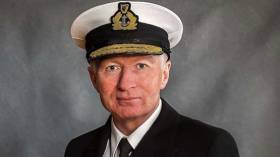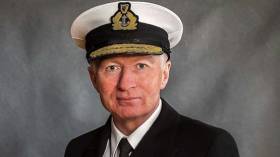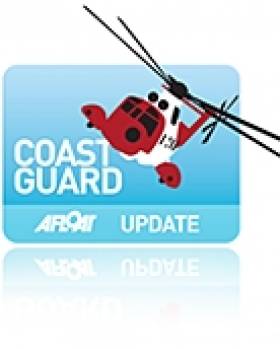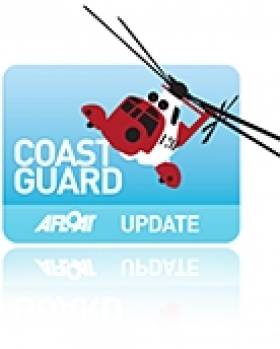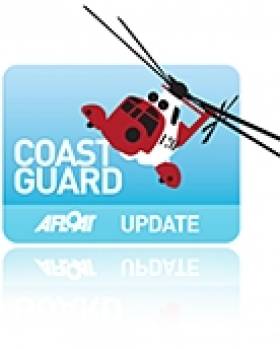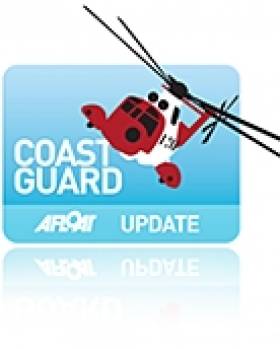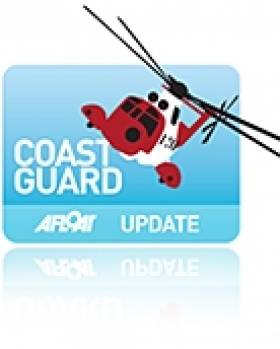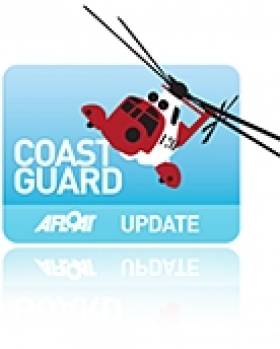Displaying items by tag: Chris Reynolds
Outgoing Irish Coast Guard Head Says Air Corps Has to be Available "24/7" if it Wants to Return to Search & Rescue
The outgoing head of the Irish Coast Guard Chris Reynolds has said he has nothing against the Air Corps returning to search and rescue if it can guarantee it is available “24/7”.
In an interview with The Sunday Independent, Reynolds, who is head of the European Union Capacity Building Mission in Somalia, confirmed that the Department of Transport turned down his application for extended leave of absence to September 2022.
Last week, he confirmed he was leaving the Irish Coast Guard to stay on as head of the EU mission in Somalia.
Reynolds, a former Naval Service officer who was appointed to head the Irish Coast Guard in 2007, was seconded to Somalia with the EU in July 2016.
However, he spent 15 months back in Ireland with the Coast Guard after the Rescue 116 crash in March 2017, and before his promotion from deputy to director of the EU mission in 2019.
“I knew I had to come home – it was a traumatic time for the families of the four aircrew and for everyone in the Irish Coast Guard,” he said.
Reynolds said that relations between him and the department were so poor that he was initially prevented from visiting Irish Coast Guard stations on his own without a civil servant.
Reynolds said that he had argued as far back as 2011/12 for more resources for the Irish Coast Guard.
“I had identified that the organisation was deficient in health and safety, in resources and aviation expertise, and all of these areas have now been addressed,” he said.
“After the helicopter crash, the department had the stark choice of resourcing it or closing it down.”
“The case I had made for extra staff and funding was granted, and I am happy that I was able to put the Irish Coast Guard back together again,” he said.
 As part of its fleet, the Air Corps currently operates two Casa CN 235 Maritime Patrol Aircraft. These aircraft entered service in 1994 and operate seven days a week usually in the offshore maritime patrol arena. Photo: Air Corps
As part of its fleet, the Air Corps currently operates two Casa CN 235 Maritime Patrol Aircraft. These aircraft entered service in 1994 and operate seven days a week usually in the offshore maritime patrol arena. Photo: Air Corps
Reynolds said he also approached the then Tánaiste Simon Coveney about merging the Irish Coast Guard with the Naval Service.
Since the Government began plans for a new search and rescue contract for the Irish Coast Guard, Reynolds has been critical publicly of the Air Corps bid to become involved.
The Air Corps was withdrawn from search and rescue in 2004. At the time, its crews were based in Sligo, with three other search and rescue bases run on contract.
Currently, all four bases are contracted to CHC Ireland, and a service level agreement with the Air Corps is for aircraft “as and when available”.
Late last month, the Government signalled it would proceed with formal procurement for a new contract in October, and indicated that the Air Corps could provide a fixed-wing element to the Coast Guard’s overall aviation service.
“The point is that the Air Corps has to be able to guarantee it is there 24/7, 365 days a year,” Reynolds said.
In March 2017, the Air Corps was not able to provide a Casa maritime patrol aircraft when it was asked to provide top cover for the Sligo-based Irish Coast Guard helicopter in a medical evacuation 250 km west of Mayo.
The Dublin-based Rescue 116 crew was then tasked to provide top cover and crashed at Blackrock island – claiming the lives of all four crew, two of whom are still missing.
Read The Sunday Independent here
Irish Coast Guard Director Chris Reynolds to Stay on in Somalia
Director of the Irish Coast Guard Chris Reynolds, on assignment as Head of Mission Eucap Somalia, is not returning to the Coastguard in Ireland.
In a post on social media, Reynolds says: "With a heavy heart I will not be returning, but staying on in Somalia. After a decade as Director probably enough."
In 2019, Reynolds, who is currently on secondment to the EU, was appointed Head of the EU capacity building mission in Somalia, EUCAP Somalia.
The Irish Coast Guard is Ireland's fourth 'Blue Light' service (along with An Garda Síochána, the Ambulance Service and the Fire Service). It provides a nationwide maritime emergency organisation as well as a variety of services to shipping and other government agencies.
The Irish Coast Guard has responsibility for Ireland's system of marine communications, surveillance and emergency management in Ireland's Exclusive Economic Zone (EEZ) and certain inland waterways.
And so I come to my last day of 44 years of uniformed service to my country. With a heavy heart I will not be returning to the Coast Guard but staying on in Somalia. After a decade as Director probably enough. pic.twitter.com/UdLfPgf2G1
— Chris Reynolds (@Crickie2) August 4, 2021
Coastguard Chief Speaks Of Sorrow Over Lost Colleagues Ahead Of Return From EU Secondment
#Coastguard - Irish Coast Guard director Chris Reynolds has paid tribute to the lives lost in the Rescue 116 and Kilkee tragedies ahead of his return from secondment in Somalia.
“The Coast Guard has lost five colleagues to accident and one, Daithi O’Cearbhallain, to cancer. I’ve lost six good friends,” said Reynolds, according to The Irish Sun.
“Not being at home and with my team in the Coast Guard has been very, very difficult,” he added.
“My first intention on my return in October is to visit our volunteer teams, co-ordination centres and helicopter bases to listen and understand how we will move forward.”
Reynolds was seconded to Somalia in July 2016 as part of an EU maritime security mission in the Horn of Africa.
Two months after his departure, coastguard volunteer Caitriona Lucas died during a search operation in Kilkee when her RIB capsized.
Six months later, Rescue 116 crashed at Black Rock in Co Mayo, claiming the lives of its four crew. Capt Dara Fitzpatrick and Capt Mark Duffy were recovered, but the bodies of winch men Paul Ormsby and Ciaran Smith were not found.
#Coastguard - Irish Coast Guard director Chris Reynolds has been seconded to Somalia as part of an EU maritime security mission in the Horn of Africa.
Reynolds was granted special leave to take the position with EUCAP Nestor based in the Kenyan capital Nairobi from on 19 July – the first time that the Irish Coast Guard has been involved in an overseas mission.
The role involves assisting local authorities with setting up their own coastguard service in a region that's been beleaguered by maritime piracy in recent years.
Ireland's coastguard chief is responsible for all operations and field offices of the EUCAP Nestor mission between Mogadishu, Puntland and Somaliland, as well as a training base in Djibouti.
Reynolds will return to his Irish Coast Guard post after his secondment, which the Department of Transport says will last around two years "subject to how the mission evolves".
Speaking of his appointment, Reynolds said: "I believe this is a recognition, on an international level, that we in the IrCG, both volunteer and professional, do a good job and that we have gained the respect and trust of all the communities we serve and all the partners we work with.”
#COASTGUARD - The Irish Examiner reports today that the Irish Coast Guard has severely criticised the first draft of the 'value for money' report on the coastguard service commissioned by Transport Minister Leo Varadkar.
Senior IRCG management berated the work of the consultants Fisher Associates who were commissioned to undertake the studies into the coastguard and Marine Survey Office.
In their observation of the report's first draft, they cite "uninformed or poor analysis; lack of dialogue on matters surfaced; lack of understanding of where the IRCG has competency or control on particular matters and where they are departmental competencies; laziness in fact finding; ignorance of how coast guards function and failure to recognise command and control issues."
They also slated "sloppiness" in the report's incorrect spelling of the service as the 'Irish Coastguard', arguing that it "reflects very, very poorly on Fisher's ability or competence in these areas".
The news comes ahead of Irish Coast Guard director Chris Reynolds' appearance before the Oireachtas Transport Committee tomorrow (Wednesday 24 October) to discuss the future of the national network of coastguard stations.
Fianna Fáil Senator Mark Daly, who worked to bring Reynolds before the committee, claims that the coastguard head's agenda is to close the stations at Valentia and Malin Head while retaining the Dublin station and a sub-base in the Transport Minister's constituency.
Elsewhere in the Irish Examiner, Dan Buckley comments on the local campaigns to save the "vital" bases at Valentia and Malin Head.
As previously reported on Afloat.ie, coastal communities in Kerry have joined with their counterparts in Donegal to protest mooted plans to close their coastguard radio stations, despite the wealth of local expertise and hundreds of thousands of euro worth of recent investment.
Unified EU Coastguard On The Cards
#COASTGUARD - Greater co-operation between Europe's coastguard organisations is inevitable, according to the Irish Coast Guard director.
Chris Reynolds was speaking at Search and Rescue 2012, the EU Heads of Coastguard conference in Dublin last Thursday, at which he outlined a feasibility study being conducted by the European Commission on a standardised coastguard service across Europe.
As Shephard Media reports, Reynolds admitted that some challenges stood in front of any effective change in the sector, noting that SAR policy at member state level is often spread across many departments.
But the Costa Condordia disaster off the Italian coast recently may focus governments to develop a "sense of urgency" on the issue, he said.
In the keynote address at the conference, Italian coastguard chief Giuseppe Troina said it was fortunate that the death toll in that incident had not been much greater, emphasising that more than 4,000 people survived the cruise ship's sinking.
The Irish Times has more on the story HERE.
New Helicopter for Irish Coast Guard is Completed
#COASTGUARD - Sikorsky has completed production of a new S-92 helicopter for the Irish Coast Guard under the rescue service's €500 million deal with CHC Ireland.
The US-based helicopter firm and CHC formalised the purchase on Wednesday (21 December) with Irish Coast Guard director Chris Reynolds during a hand-over ceremony at the S-92 commercial helicopter assembly facility in Coatesville, Pennsylvania.
Equipped for dedicated search and rescue (SAR) operations, the helicopter will provide coverage for deep Atlantic Ocean missions, service Ireland's offshore islands and provide rescue cover on the west coast from Cork to Galway.
The new aircraft will be based at Shannon and will replace the current coastguard SAR helicopter, a Sikorsky S-61, which has given 20 years of unbroken service.
According to Sikorsky, the S-92 is equipped with advanced systems and hardware, including an automated flight control system that enables the pilot to fly pre-programmed search patterns and perform delicate hover manoeuvres; a wireless intercom allowing a rescue swimmer to communicate with the crew; radio transceivers to communicate with ships and rescue services; a weather radar and infrared sensor; and a digital video system to record rescues.
Reynolds said the new helicopter - which joins four second-hand machines on a 10-year lease - represents a stepped improvement in Ireland's ability to care for and service its seagoing, coastal and island communities.
"I am very happy that the Coast Guard will operate what I consider to be the leading SAR helicopter in the world," he added.
As reported earlier this year on Afloat.ie, the new chopper is part of a deal that raised questions from a Fine Gael TD over allegations that a competing tender did not have a "good reputation".
Fergus O'Dowd questioning the contract with CHC Ireland after receiving documents in which Chris Reynolds said the Air Corps – whose helicopters are supplied by AgustaWestland - were uneqipped for the role and that no cost saving would be made if they took on the service.
New Coastguard Command Vehicle For West Coast
#COASTGUARD - The Irish Coast Guard has received the keys to a new Mobile Incident Command Vehicle to be based in Sligo.
Minister of State Michael Ring made the presentation to Irish Coast Guard director Chris Reynolds ahead of the body’s annual conference in Westport last weekend, Mayo Today reports.
The new vehicle will be used for on-scene management of major marine emergencies aling the west and north-west coasts. It is fitted with all modern communications equipment and will be on call 24/7.
Reynolds commented: “Over the past few months we have launched five new coastguard boats and early next we will see the delivery of seven new vessels.
“This month we will take delivery of 11 new vehicles including vans and 4x4s and in the coming weeks, we take delivery of our new S92 helicopters.”
Ireland Bidding for European Coast Guard Secretariat
Ireland is bidding to bring the proposed Europe-wide coastguard secretariat to Dublin, The Irish Times reports.
Irish Coast Guard director Chris Reynolds is in charge of setting up the new office as chair of the EU Heads of Coast Guard network, many functions of which it is expected to assume.
The secretariat - which will meet in Dublin while the particulars of its compositoon are worked out - aims to share search and rescue resources across the EU, as well as assist in pollution response, patrolling of fisheries and maritime security.
One of Reynolds' main tasks is to "draw up procedures for improved co-operation between European coast guards" and those of non-EU members Norway, Iceland and Russia.
The Irish Times has more on the story HERE.
Irish Coast Guard Reveals Spike in Incidents Involving Leisure Activities, Merchant Vessels
The Irish Coast Guard has released statistics revealing a busy summer period and a significant increase certain types of search and rescue incidents.
Most notable is the increase in incidents involving leisure activities such as surfing, diving, and canoeing.
There was also an increase in the number of merchant vessels requiring assistance, which was up approximately 50% on 2010 figures.
Irish Coast Guard director Chris Reynolds said: "We began our safety awareness campaign in May, which was aimed at holidaymakers and members of the public who were planning water sports, enjoying cliff walks or engaging in coastal activities throughout Ireland. We also targeted walkers and climbers.
"Despite the advice and information provided, we have seen a significant increase in requests for assistance for some incidents over this summer (particularly leisure-based water-activities) and a 20% increase in taskings of our helicopters and crews."
However, Reynolds added that while the total number of incidents has remained broadly the same as last year, there was a 75% increase in lives saved so far in 2011 "which demonstrates that the Coast Guard safety message is getting through".


























